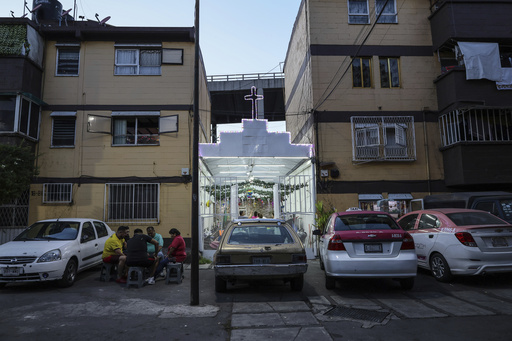
MEXICO CITY — On a sunny afternoon in the Roma district of Mexico City, Rosa María Espinosa gathers with nearly 80 men beneath a park pavilion to engage in a game of poleana, which is a strategic board game known for its mental challenges and has roots tracing back roughly a century to the city’s prisons. It is an event filled with camaraderie, laughter, and a touch of competition, where Espinosa finds herself as the lone female among the participants.
Although poleana has long been associated with a negative stigma due to its prison origins, it is experiencing a resurgence as people from various backgrounds are discovering its unique charm. Espinosa, reflecting on the game, remarks, “It’s a lot of adrenaline. But sometimes the dice aren’t lucky.”
The mechanics of poleana involve a square wooden board with a sunken area for dice rolling. Four players each manage four pieces as they race to maneuver their pieces off the board, using calculated dice rolls and strategies to get there first while also attempting to block their opponents. Symbolically, the board represents confinement, and winning—while remaining metaphorical—reflects a release from those boundaries. Although Espinosa has never been to prison, she enjoys the game and appreciates its depth. “People used to say ‘these folks know how to play because they’ve been to prison,’” she noted.
Alejandro Olmos, an archaeologist and anthropologist focused on Mesoamerican games, has extensively studied and played poleana. He attributes its lineage to the ancient Indian game of chaupar, which dates back to around 600 A.D. Its journey continued as it spread to various regions under diverse names after British colonization, with similar games like Ludo and Parcheesi becoming popular in the West. The version of the game known as poleana emerged around the 1940s within the prisons of Mexico City, with Lecumberri prison likely being where the game and its unique rules were first formalized. Olmos explains that “All cultures have a process called adoption-transformation,” and in Mexico, the game reflects the harsh realities of prison life where “mistakes are not pardoned.”
Over the past six years, Jonathan Rulleri launched a family business aimed at promoting poleana and fostering connections among various community members. One of his initial hurdles involved establishing standardized rules for a game that has transitioned from prison to public spaces. He learned to play while incarcerated and faced difficulties in finding employment after his release, a common challenge for many ex-prisoners. Eventually, he pivoted from an ill-fated taco delivery service to making and selling poleana game boards, which quickly garnered interest once he showcased them on social media. Thus, his company, Poleana Cana’da Frogs—named for a slang term for prison—has hosted over 55 poleana tournaments in public areas while emphasizing a family-focused, betting-free environment, with Rulleri aiming to change the perception of the game as merely for inmates or misfits.
In the 1980s, poleana began to extend its reach beyond prison walls, taking root in some of Mexico City’s tougher neighborhoods. Tepito, known for its street commerce and boxing, is one such area where one can often find players engaged in intense games, sometimes late into the evening. Fernando Rojas, who learned poleana at the age of 18 and honed his skills while incarcerated, describes the game as a critical escape from the grim aspects of prison life. “It really helps you escape the reality of being a prisoner,” Rojas said. Now, outside of prison, he uses the game for therapy, seeking stress relief and a distraction from family issues. Carrying his essential game pieces in a small plastic bag, he frequently joins friends for games at the local handball court.
In poleana, plays and number combinations also hold special names, with a roll of six being humorously referred to as a “six pack.” Rolling doubles elicits excited shouts of “pares y no pares”—a clever wordplay. While luck certainly plays a role in the game, strategic thinking and math skills are equally crucial. This dynamic has made Diego González and Dana López enthusiastic about their 7-year-old son Kevin learning poleana, as it stimulates both fun and mental agility.
González, who also crafts poleana boards through his family business Poleanas Iztapalapa, channels his creativity into his work, having experienced prison life a decade ago. His personalized boards—complete with features like Bluetooth speakers and strobe lights—have become popular gifts for various celebrations. Special requests often include images of deceased relatives in the area reserved for dice, showcasing the sentimental value players attach to the game. Interest in poleana surged during the COVID-19 pandemic, as families sought entertainment while staying home. “People realized it’s not a bad game; it’s a game of strategy that brings families together,” González remarked.
